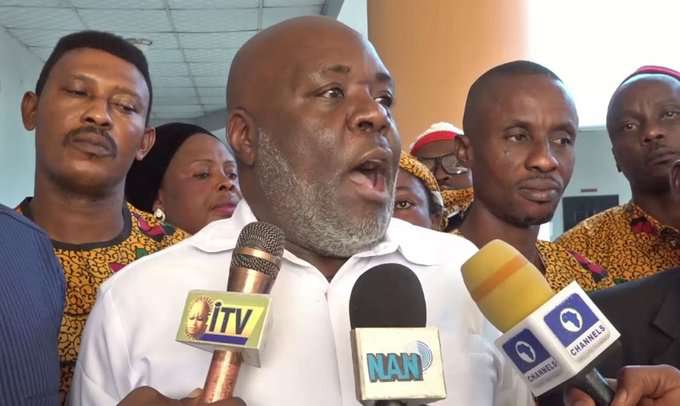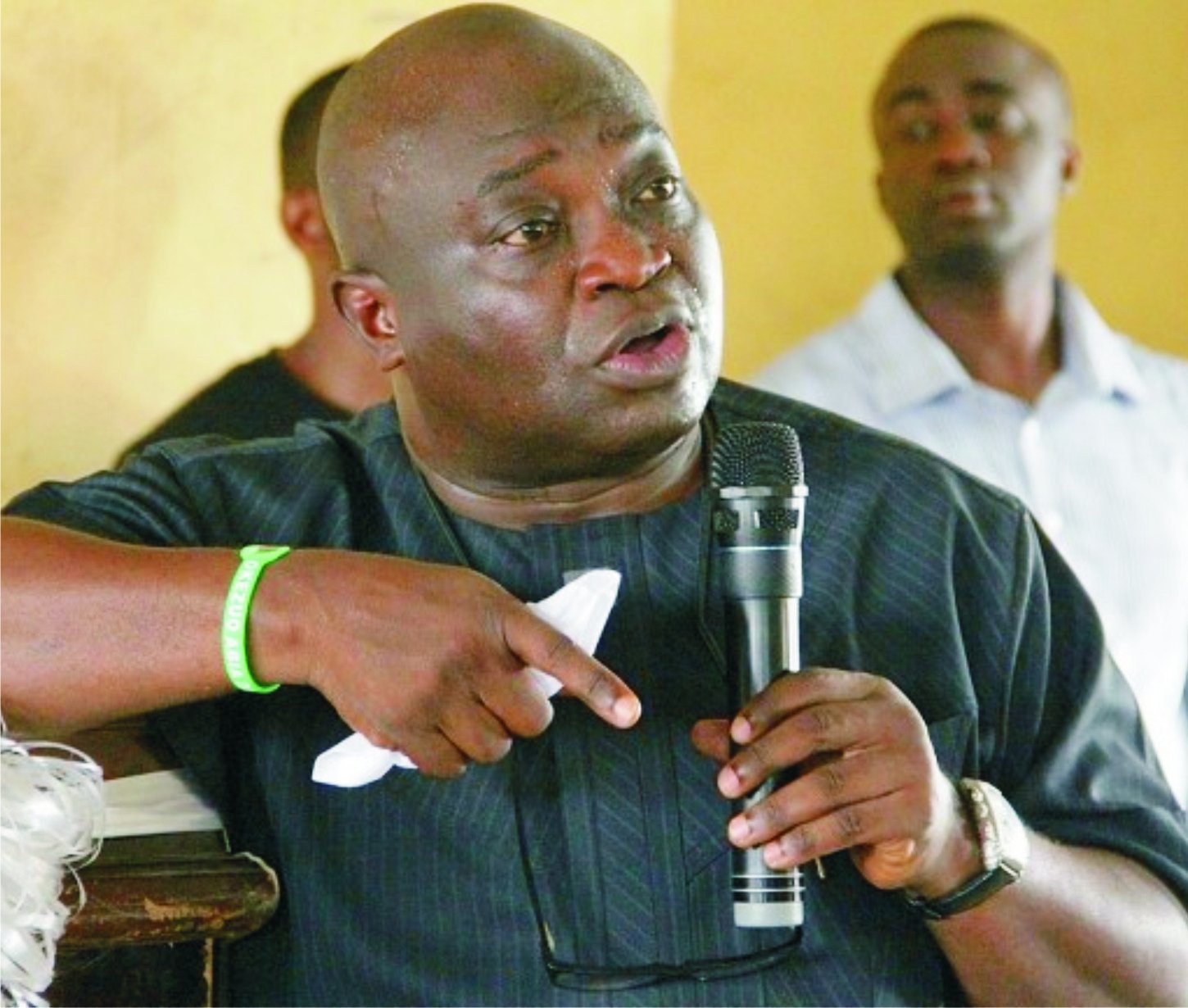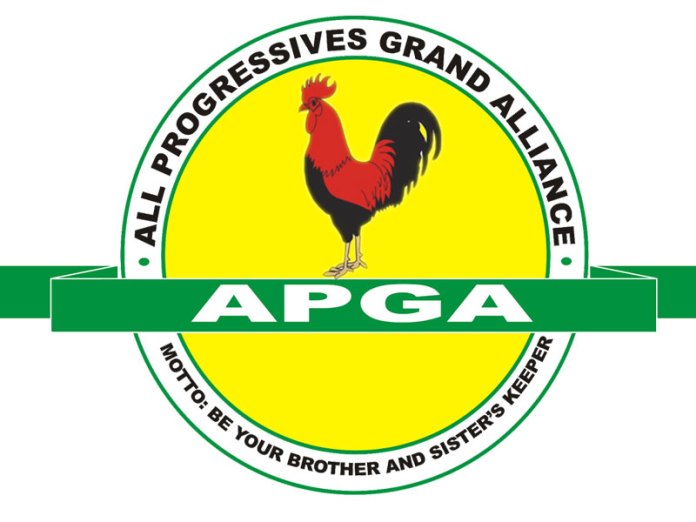Headlines
APGA in the throes of death; unless Alex Otti wins
By OBINNA EZUGWU
It is no longer news that the All Progressives Grand Alliance (APGA) is locked in serious crisis over the outcome of the recently concluded primary elections. What is news, however, and although it may not seem obvious yet, is that what is being witnessed, as the days roll by, and as the crisis takes new twists is almost certainly, the beginning of the end of a party that once prided itself as the voice of the Igbo.
When Chief Chekwas Okorie nursed the idea of APGA in 1991, he sought a political platform that would serve as a voice to Ndigbo. And when it eventually came into fruition in 2003, it was a response to the Alliance for Democracy (AD) in the South West and the All Nigeria People’s Party (ANPP) in the North.
“The strong desire to found a national political party based on Igbo initiative motivated me to rally a few associates on the platform of Igboezue Cultural Association which I founded in 1991 with the Motto of Onye Aghala Nwanne Ya (Be Your Brother’s Keeper) to embark on the mission of forming a political party,” Okorie recalled.
“In 1996 we submitted the application to register the Peoples Democratic Congress (PDC) to the Electoral Commission. PDC was not registered. In 1998 we resubmitted the application to register PDC, we failed the second time.
“Not deterred by these failures we approached the Independent National Electoral Commission, INEC, the third time to register the United Progressive Grand Alliance, UPGA. Let me recall that in all three applications we used the Motto: “Onye Aghala Nwanne Ya”, Be Your Brother’s Keeper, and the logo was the Cock; for reasons that will be found in the main Book that is in the making, they rejected it.”
UPGA was to transmute to APGA in 2003 with the late Ikemba Emeka Odumegwu Ojukwu as its founding figure. Still battling the effect of devastating civil war that ended only decades earlier the Igbo, more than any other group in the country needed a new political identity, a renaissance of sorts. There was a void in the Igbo political consciousness which the People’s Democratic Party (PDP), despite being the dominant political party in the South East, could not fill.
APGA was to fill that void – a political platform for the aggregation, projection and protection of the Igbo interest.
Chief Okorie knowing what he wanted to achieve with an Igbo centric political party, and knowing that the only person who could help him achieve that was Ojukwu, encouraged him to assume the party’s leadership and right from inception, APGA wore Ojukwu’s identity. And once it did, it didn’t need any campaigns to win the support of the Igbo.
Ojukwu ran for president in the 2003 general election on the APGA platform. And despite the massive rigging of the polls in the South East by PDP and its incumbent President at the time, Olusegun Obasanjo, he still managed to come third behind Obasanjo and Buhari, then of the ANPP.
APGA with Ojukwu as its undisputed leader was making gradual inroad in the South East. Although many political personalities in the South East were members of the PDP at the time, they had soft spot for the party, and contributed in their own capacities to its sustainability.
In that 2003 election, APGA governorship candidate in Anambra, Mr. Peter Obi won the election. In Enugu, Ugo Agballa, the party’s governorship candidate shook the political landscape. He was only stopped by the brute force of then governor of the state, Dr. Chimaroke Nnamani.
In Anambra, Obi was however, initially denied by the rigging machinery of the PDP which ensured that Dr. Chris Ngige became governor. Fortunately, Obi, helped by the disagreement between Ngige and his then godfather, Chris Uba, was able to reclaim his mandate through the court in 2006.
With a governor and the party’s leader in Anambra, the state was to provide an effective foothold for it to expand to other South East States. And it hadn’t really done a bad job of it, despite what Okorie had noted was a relentless attempt by Obasanjo to kill APGA for fear of Ojukwu using it to climb into political prominence.
“The Obasanjo presidency regarded APGA as a National Security risk, from the very moment Ojukwu emerged as the presidential candidate of our party,” Okorie said.
“Chief Obasanjo told me this much. They had the morbid fear that if APGA was allowed to spread and gain root in the East, that Dim Odumegwu-Ojukwu would re-enact his Biafra mission. To halt APGA’s expansion and if possible destroy it became a state policy of the Obasanjo Administration. Chief Victor Umeh was quite handy to do the hatchet Job. This is the truth of the matter. This was the genesis of the APGA imbroglio.”
But even with the party’s leadership crisis, it was able to take Imo State in 2011 with Rochas Okorocha beating then incumbent Ikedi Ohakim.
But as it turned out, the Imo governor was a monumental mistake for APGA. Always leaning towards the North, he quickly abandoned APGA in 2013 to join the All Progressives Congress (APC). The party suffered a major setback.
“When Bola Tinubu started to develop his sphere of influence within his region, he mounted on AD, AC, ACN to be able to pull his people together. Ojukwu did that and handed over to the next generation,” noted Prof. Max Nduaguibe, a chieftain of the party.
“The party was used to develop Anambra state. If you go to Anambra today, it’s one of the states in the country that is fairly developed. It is also on the platform of APGA that Rochas Okorocha won Imo governorship, but he betrayed the party. That was when betrayal started.”
But it was indeed Ojukwu’s demise in 2011 that was to mark a turning point in the party. It subsequently lacked a natural leader; a father figure. And what was worse, Chief Victor Umeh had forced Chief Okorie out of the party, such that it was rapidly becoming an Anambra affair.
As governor, Obi proved to be an excellent administrator. But he was a terrible party man. He lacked charisma. His frugality could not buy him followership. He probably didn’t understand the reality of today’s politics. As a result, APGA could not really grow under his leadership.
The party went from bad to worse. But for Ojukwu and Goodluck Jonathan 2010 was to mark the end of APGA in Anambra and indeed elsewhere. Ojukwu pleaded. Jonathan helped to ensure that Obi retained his seat, undermining his party’s candidate, Tony Nwoye.
Chief Willie Obiano became governor 2014. Bickering between him and Obi caused the latter to leave the party for the PDP that same year. And as much as Obi proved a terrible party man who had little understanding of what he needed to do with APGA, Obiano has proven, perhaps, even worse.
“Obi left the party after his governorship and went to PDP. He left the party more or less intact for Obiano,” noted Prof. Nduaguibe.
“It is a shame that the party is being destroyed in the face of Obiano. As the leader of the party, the party is completely being destroyed.”
It is ironic that a political party that loves to pride itself as the voice of Ndigbo, and has excelled by leveraging on the Ojukwu name, turned out to be the most antagonistic of the same ‘Igbo interest.’
On the question of Igbo marginalisation that the party ought to lead the fight against, it has failed to do so. Indeed, it is difficult to point where the party stands on issues that affect the Igbo, particularly as it concerns the restructuring of the country.
Many observers would have watched helplessly as members of the Movement for the Actualization of the Sovereign State of Biafra (MASSOB) were being hacked down under the watch of Ngige in Anambra in 2005, and thought that with APGA and Obi, things might be different. But it got even worse. And if it got worse with Obi, it reached catastrophic proportions under Obiano.
Obiano’s regime coincided with the emergence of the Indigenous Peoples of Biafra (IPOB). As a governor of the Federal Republic of Nigeria, nobody could have expected Obiano to openly identify with a separatist group like IPOB. But at the same time, nobody would have expected that the leader of an “Ojukwu” party will watch without uttering even a word of condemnation while hapless youths were being killed for holding protests.
But he did not just watch it happen, he shook hands with their killers, posed for photographs with broad smile and abused the victims instead. Obiano has ensured that there is nothing of Ojukwu in APGA beyond uniforms. He may yet ensure the end of APGA itself.
Of all the ironies of APGA, none is perhaps more ironic than the fact the party embarrassingly denied the widow of the same man it uses his name to sell itself, Mrs. Bianca Ojukwu, the party’s Anambra South Senatorial ticket in the recently held primary elections. Some may argue, however, that there were actually no primaries in the first place. The party’s ticket may have just gone to the highest bidders.
By first fixing its nomination forms at an outrageously high price, no one was left in doubt that the current APGA has no more than material interest to protect. The foundational ideals of the party have, apparently, gone with the winds.
“The merchants who took over the party with Obiano decided to use it to make money. And they have made sufficient money from Imo people, from Abia people, even from Anambra people,” regretted Nduaguibe who served as Deputy National Chairman of the defunct Democratic Party of Nigeria (DPN)
“You can see that they even denied the wife of Ojukwu ticket. Because they felt she was not going to give them the kind of money they wanted.”
It is now an open secret that Chief Obiano had allegedly stuck a pact with President Muhammadu Buhari to help the president’s reelection bid in 2019. But that’s an arrangement that Obi’s emergence as PDP vice presidential candidate will effectively alter.
The worst Obiano can do at the moment is to campaign against Obi openly. But that is sure to blow over. It could amount to the governor digging his own political grave, and invariably, that of APGA.
But either way, if the future of APGA will depend on Anambra, it is as good as dead. Not just because its’ present “Anambra-centric” leadership had reduced it to just a platform for money making, but the incumbent governor, is unlikely going to succeed in ensuring the party’s survival beyond his tenure.
On the other hand, too, if the PDP wins presidency in 2019, Obi’s influence may serve to ensure that Anambra becomes more or less, a PDP state. Except, perhaps, he will make conscious efforts to preserve the party. If Buhari wins on the other hand, it is highly likely that Obiano will join the APC after his tenure. And that may well be the end.
The only hope perhaps is the prospect of Dr. Alex Otti emerging governor in Abia. The former banker, one could say, has the discipline to stay put and groom the party.











